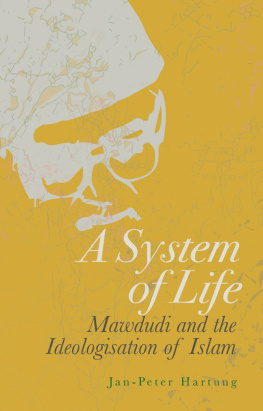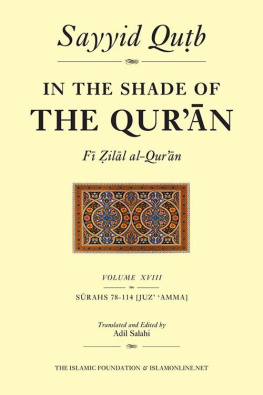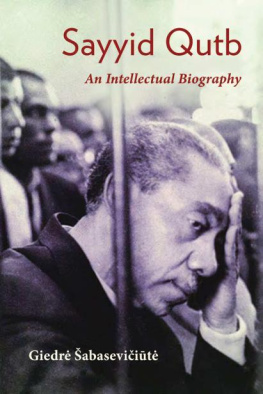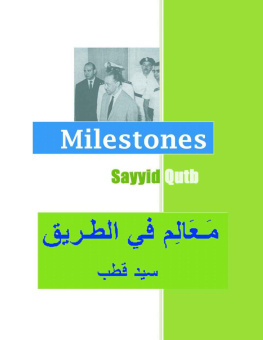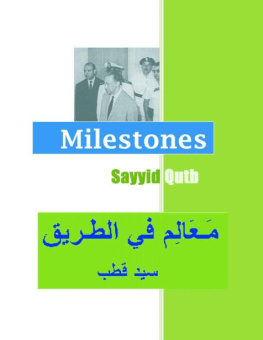SAYYID QUTB AND THE ORIGINS OF RADICAL ISLAMISM
JOHN CALVERT
Sayyid Qutb and the Origins of Radical Islamism


Oxford University Press, Inc., publishes works that further
Oxford Universitys objective of excellence in research, scholarship, and education.
Oxford New York
Auckland Cape Town Dar es Salaam Hong Kong Karachi Kuala Lumpur Madrid Melbourne Mexico City Nairobi New Delhi Shanghai Taipei Toronto
With offices in
Argentina Austria Brazil Chile Czech Republic France Greece Guatemala Hungary Italy Japan Poland Portugal Singapore South Korea Switzerland Thailand Turkey Ukraine Vietnam
Copyright 2013 by Oxford University Press
Oxford is a registered trade mark of Oxford University Press in the UK and certain other countries.
Published by Oxford University Press, Inc
198 Madison Avenue, New York, New York 10016
www.oup.com
Oxford is a registered trademark of Oxford University Press
All rights reserved. No part of this publication may be reproduced, stored in a retrieval system, or transmitted, in any form or by any means, electronic, mechanical, photocopying, recording, or otherwise, without the prior permission of Oxford University Press.
Library of Congress Cataloging-in-Publication
Data Calvert, John.
Sayyid Qutb and the origins of radical Islamism / John Calvert.
p. cm.
ISBN 978-0-19-932687-7 (alk. paper)
1. Qutb, Sayyid, 19061966. 2. Islamic fundamentalismEgypt. 3. Jamiyat al-Ikhwan al-Muslimin (Egypt) 4. Islam and stateEgypt. I. Title.
BP80.Q86C35 2010
320.557092dc22
2009051954
1 3 5 7 9 8 6 4 2
Printed in the United States of America on acid-free paper
CONTENTS
For the most part, I have used a simplified version of the system of transliteration adopted by the International Journal of Middle East Studies. I use the diacritic () for the Arabic consonant ayn, as in Ali or ulama, and () for hamza, the character that represents the glottal stop, as in Shir. I have not employed the subscript diacritics, nor have I assimilated the l of the definitive article al- to the following consonant. Ta marbuta, signifying feminine singular endings, is written with a terminal a; the adjectival -ya followed by ta marbuta is rendered -iyya. I have generally transcribed proper names according to this system of transliteration, the primary exception being Abd al-Nasser, which follows the relatively established rendering of the name in English. I provide initial references to Arabic books in transliteration and English translation. Thereafter, I use the English translation only.
My first encounter with Sayyid Qutb occurred, appropriately enough, in Egypt, where I studied Arabic at the American University in Cairo in the late 1980s. I had arrived in Cairo as an aspiring mediaevalist, intent on investigating the history and culture of the Mamluks. Soon enough, however, the pulse of contemporary history took hold of me, nudging the mediaeval dynasties to the periphery of my academic interest. In those days, trouble was brewing in Egypt. Seven years after the Jihad Group assassinated Egyptian President Anwar Sadat, militant Islamist organizations were again on the prowl, especially in the middle and southern regions of the country, and Sayyid Qutbs name was in the air. At that point, I did not know much about Qutb or his influence on the modern jihadi trend. It was only after I began talking with knowledgeable people, poked around the sprawl of Cairos bookstalls, and read Gilles Kepels The Prophet and the Pharaoha pioneering work on Egyptian Islamismthat the importance of the man came home to me. I thought that here is somebody worth studyinga man who drew upon the hallowed corpus of the Islamic heritage in order to craft a vision of life and governance ostensibly different from that currently in place.
I did not know it at the time, but that initial spark of interest marked my transition from mediaevalist to student of modern history, and signalled years spent in the company of Sayyid Qutbs written work. This book, then, is the fruit of my efforts to understand the evolution of the thought of one of the most significant figures of radical Islamism. But beyond Qutbs influence on Islamism, what was it about him that intrigued me? I came to the subject prior to 9/11, so I was not motivated to study him in the light of bin Laden and al-Zawahiri, as so many have been. Looking back, I think I was fascinated, and unnerved, by Qutbs ideological certaintyhis conviction that there is in the universe an objective truth holding answers to all of lifes quandaries, which people are obliged to realize in the here and now, forcefully if necessary. As someone possessed of a liberal and questioning attitude, at least on most matters, I was interested in discerning the circumstances and motivations that might lead a person, such as Qutb, to struggle and sacrifice at the altar of an abstract, encompassing idea.
Certainly, Qutb was not alone in espousing ideological certainty. From the nineteenth century to our own time, numerous leaders and followersadherents of Anarchism, Communism, Nationalism, and Imperialismhave laid claim to truth in attempts to realize utopian dreams or manifest destinies, usually with harmful consequences. In the 1950s, as the Cold War unfurled, Eric Hoffer famously referred to such people as true believersindividuals who plunge headlong into an undertaking of vast change. Qutb was not quite the impetuous fanatic that Hoffer had in mind. His staunch morality propelled but also mollified his ardour, to the extent that many Muslims who are in no way attracted to radical causesin other words, the vast majority of Muslims in the worldwill read aspects of his works for benefit. Yet there is no denying the fact that Qutb, gripped by the design of the universe, was driven by the belief that he was defending Gods absolute truth against the apparent barbarism of the modern world. Ultimately, then, I wanted to know how, why, and to what effect, Qutb transformed the ritualistic and latitudinarian faith that he had inherited from his father into a political discourse of opposition.
Because this project has evolved over a long period of time, I have many people and institutions to thank. I have benefited from various forms of support provided by Creighton University, including a Summer Faculty Research Fellowship that allowed me to return to Egypt to consult journals and archival materials. I owe a debt to Creightons Reinert-Memorial Alumni Library, especially to Lynn Schneiderman, its inter-library loan specialist. I owe special debts to a number of scholars whose influence, either direct or indirect, permeates this work. Issa J. Boullata, Emeritus Professor of Islamic Studies at McGill University, guided my first excursions into the thought-world of Sayyid Qutb. I am grateful to him for his expert advice on textual sources and interpretive schemes. One could not ask for a better mentor. From Adnan Musallam I gained an understanding of the pre-Islamist phases of Sayyid Qutbs career. William Shepard, the doyen of Qutb scholars, aided me in making sense of the transitions in Qutbs Islamist thought, and was always quick to respond to my queries. I thank both of these scholars for paving my way. Over the years, Joel Gordon has been willing to share with me his deep knowledge of modern Egyptian history and culture and to offer feedback on some of my articles relating to Qutb; for all of that I am most grateful. I benefited immensely from the helpful insights and pointers of Thomas Hegghammer who read and commented on the manuscript. This study is all the stronger for his sage advice. Rasheed El Enany, Leon Carl Brown and Ahmed al-Mansoori shared with me articles, insights and documents relevant to the topic. I thank them for their generosity. I have also benefited from the assistance of Musa al-Hindi, Selwa Nasser, Mohammed Hagona, and Nasser Alsharif, especially in matters pertaining to Arabic. I thank Syracuse University Press for allowing me to incorporate into this study passages from Sayyid Qutbs
Next page

